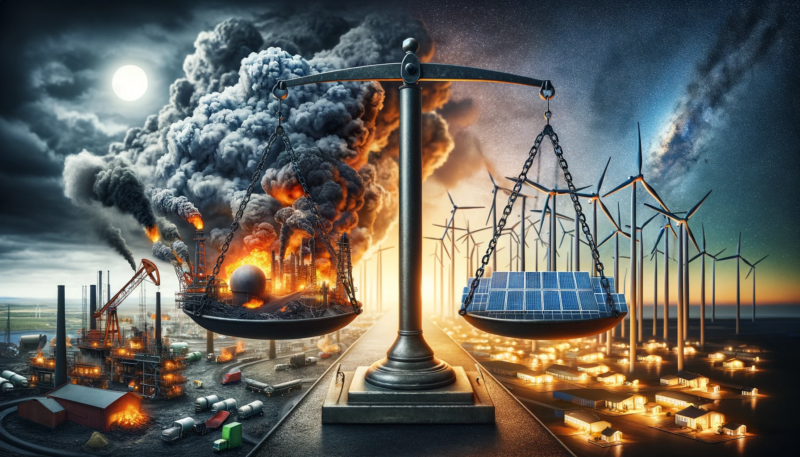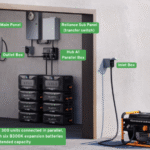For Power & Profit: The Retreat From Renewables Has A Dark & Dangerous Underside
The existential climate crisis that confronts us requires political and policy solutions that disempower the fossil fuel industry and their state allies. Unfortunately, the current US presidential election season is filled with hyperbole, controversy, and disinformation. Such discourse threatens to spawn a retreat from renewables in favor of continued burning of fossil fuels, which are having far-reaching, devastating effects on our climate and ecosystems.
It is time to hold fossil fuel businesses accountable for their part in the deterioration of the environment. Nonetheless, addressing the harmful effects of fossil fuel energy decisions across various governance levels is a complex task for policymakers.
On the positive side, local energy balancing in a new energy system that does not use fossil fuels would infuse energy self-sufficiency through smart grids based on innovative market mechanisms. Such a shift, however, would require initial regulatory steps in which sustainability disclosure standard setting and sustainability benchmarking practices would become the norm.
Be Careful What You Wish For: Trump’s Retreat from Renewables
It’s been made clear over the past several months that Trump is no fan of renewable energy. If re-elected, he has promised that he’ll gut the Inflation Reduction Act so that “all new spending grants and giveaways” will pave the way for federal savings — or so he says. While Trump also favors tariffs on Chinese goods, his pledges to weaken the Inflation Reduction Act could set back US efforts to catch up with China on solar panel and EV manufacturing.
Climate change? A hoax. Trump says that climate change is not influencing extreme weather. Five months into his administration, the Federal Emergency Management Agency and the National Oceanic and Atmospheric Administration did not have leaders. And while Trump offered federal support for relief efforts after a number of severe storms, he was slow to respond to many weather disasters, most notably Hurricane Maria in Puerto Rico.
The Paris Climate agreement? He withdrew from it once, and he’s pledged to do so again. There’s no way he’d condone voluntary GHG targets, especially when they’re individualized for each country’s build-out, capacity, and climate pollution record.
Trump originally said EVs were too expensive and had too little range. Say goodbye, Trump has threatened, to EVs — that is, unless a billionaire donates to his campaign, and then Trump will soften his position momentarily. Since Tesla CEO Elon Musk endorsed him, Trump has said he likes all kinds of vehicles, including EVs. It’s unnerving to think that Musk could become a key player after November’s election.
Still, Trump wants to eliminate tax credits in the EV tax credits that are part of the Inflation Reduction Act. This could mean rolling back the law’s EV subsidies and incentives that encourage small businesses to install charging stations. Many of the investments benefiting from the IRA are in Republican states, however, and targeting those projects may be politically unpopular with Trump’s base.
Conclusion
The fate of the renewable energy industry hangs in the balance, as the world grapples with the existential crisis of climate change. Fossil fuel corporations and their allies are leveraging their financial and political might to hold back the shift towards cleaner energy sources. It is imperative that we, the people, push back against this resistance and demand immediate action to protect our planet.
FAQs
Q: Why is Trump opposed to renewable energy?
A: Trump has pledged to gut the Inflation Reduction Act and eliminate tax credits for EVs. He has also withdrawn the US from the Paris Climate agreement and continues to dispute the science on climate change.
Q: What does this mean for the renewable energy industry?
A: A Trump victory could mean a significant rollback of efforts to transition away from fossil fuels and invest in cleaner energy sources.
Q: What can I do to support the transition to a renewable energy-based economy?
A: Advocate for renewable energy policies in your local government, invest in solar panels or renewable energy technologies, and spread awareness about the importance of climate action.
Q: How can I stay updated on renewable energy news and developments?
A: Sign up for CleanTechnica’s daily news updates or follow them on social media to stay informed about the latest news and developments in the renewable energy industry.
Q: What is the significance of the Inflation Reduction Act?
A: The Inflation Reduction Act is a landmark piece of legislation that provides funding for renewable energy projects, electrifies vehicles, and supports the growth of the renewable energy industry.




_1.png?w=150&resize=150,150&ssl=1)


(1).png?w=150&resize=150,150&ssl=1)